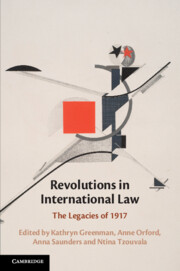29 results
In Defense of Comparisons: Russia and the Transmutations of Imperialism in International Law
-
- Journal:
- American Journal of International Law / Volume 116 / Issue 4 / October 2022
- Published online by Cambridge University Press:
- 27 October 2022, pp. 710-719
- Print publication:
- October 2022
-
- Article
-
- You have access
- Open access
- HTML
- Export citation
Part II - Institutions and Orders
-
- Book:
- Revolutions in International Law
- Published online:
- 21 January 2021
- Print publication:
- 18 February 2021, pp 83-180
-
- Chapter
- Export citation
Part IV - Investment
-
- Book:
- Revolutions in International Law
- Published online:
- 21 January 2021
- Print publication:
- 18 February 2021, pp 269-364
-
- Chapter
- Export citation
Copyright page
-
- Book:
- Revolutions in International Law
- Published online:
- 21 January 2021
- Print publication:
- 18 February 2021, pp iv-iv
-
- Chapter
- Export citation
Contents
-
- Book:
- Revolutions in International Law
- Published online:
- 21 January 2021
- Print publication:
- 18 February 2021, pp v-vi
-
- Chapter
- Export citation
Part I - Imperialism
-
- Book:
- Revolutions in International Law
- Published online:
- 21 January 2021
- Print publication:
- 18 February 2021, pp 25-82
-
- Chapter
- Export citation
Notes on Contributors
-
- Book:
- Revolutions in International Law
- Published online:
- 21 January 2021
- Print publication:
- 18 February 2021, pp vii-viii
-
- Chapter
- Export citation
Part V - Rights
-
- Book:
- Revolutions in International Law
- Published online:
- 21 January 2021
- Print publication:
- 18 February 2021, pp 365-427
-
- Chapter
- Export citation
1 - International Law and Revolution
-
-
- Book:
- Revolutions in International Law
- Published online:
- 21 January 2021
- Print publication:
- 18 February 2021, pp 1-24
-
- Chapter
- Export citation
Acknowledgements
-
- Book:
- Revolutions in International Law
- Published online:
- 21 January 2021
- Print publication:
- 18 February 2021, pp ix-x
-
- Chapter
- Export citation
2 - Looking Eastwards
- from Part I - Imperialism
-
-
- Book:
- Revolutions in International Law
- Published online:
- 21 January 2021
- Print publication:
- 18 February 2021, pp 27-55
-
- Chapter
- Export citation
Index
-
- Book:
- Revolutions in International Law
- Published online:
- 21 January 2021
- Print publication:
- 18 February 2021, pp 428-434
-
- Chapter
- Export citation
Part III - Intervention
-
- Book:
- Revolutions in International Law
- Published online:
- 21 January 2021
- Print publication:
- 18 February 2021, pp 181-268
-
- Chapter
- Export citation

Revolutions in International Law
- The Legacies of 1917
-
- Published online:
- 21 January 2021
- Print publication:
- 18 February 2021
4 - Arguing with Borrowed Concepts
-
- Book:
- Capitalism As Civilisation
- Published online:
- 22 October 2020
- Print publication:
- 29 October 2020, pp 129-166
-
- Chapter
- Export citation
6 - Thinking through Contradictions on a Warming Planet
-
- Book:
- Capitalism As Civilisation
- Published online:
- 22 October 2020
- Print publication:
- 29 October 2020, pp 212-220
-
- Chapter
- Export citation
3 - The Institutionalisation of Civilisation in the Interwar Period
-
- Book:
- Capitalism As Civilisation
- Published online:
- 22 October 2020
- Print publication:
- 29 October 2020, pp 88-128
-
- Chapter
- Export citation
Acknowledgements
-
- Book:
- Capitalism As Civilisation
- Published online:
- 22 October 2020
- Print publication:
- 29 October 2020, pp vi-viii
-
- Chapter
- Export citation
2 - The Standard of Civilisation in the Nineteenth Century
-
- Book:
- Capitalism As Civilisation
- Published online:
- 22 October 2020
- Print publication:
- 29 October 2020, pp 44-87
-
- Chapter
- Export citation
Index
-
- Book:
- Capitalism As Civilisation
- Published online:
- 22 October 2020
- Print publication:
- 29 October 2020, pp 247-261
-
- Chapter
- Export citation



